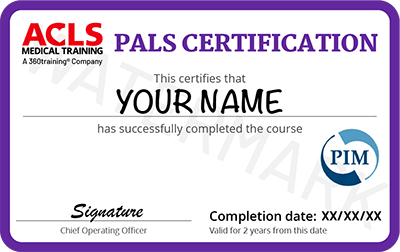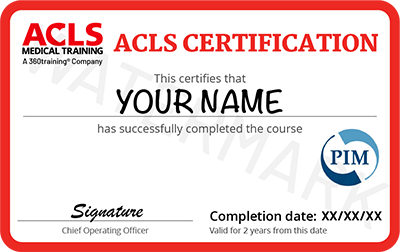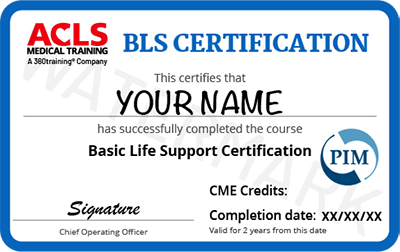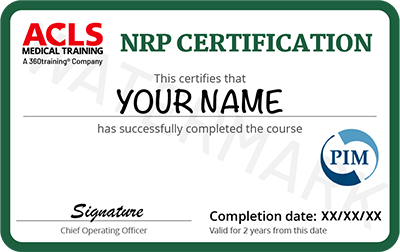Frequently Asked Questions
What Is a PALS Certification?
When a healthcare professional obtains PALS certification, it means that they’re trained in the latest best practices for recognizing and intervening during a life-threatening crisis in pediatric patients.
What Is the Difference Between ALS and PALS?
Advanced Life Support (ALS) certification – sometimes called Advanced Cardiovascular Life Support (ACLS) certification – teaches you how to stabilize adult patients during and after an acute life-threatening event, while PALS focuses on children and infants.
Respiratory and cardiac emergencies manifest and are treated differently in children and infants, which is why PALS training may be necessary even for those with ACLS certification.
Which PALS Training Is Right for Me?
If your PALS card has been expired for 12 months or longer, you should elect for the full PALS certification course.
For everyone else, the less expensive recertification course is sufficient, even if you were previously certified through a different organization or your certification has temporarily lapsed.
Is This PALS Course 100% Online?
Yes, our PALS training course is 100% online, and you do not have to complete an in-person skills test. Instead, you must demonstrate that you have mastered the didactic material by passing the PALS certification exam.
This curriculum is designed for experienced medical professionals looking for a targeted refresher of PALS certification online.
Is Online PALS Training Valid?
When the physicians at ACLS Medical Training were creating our curriculum, they decided a hands-on skills test on a mannequin is not critical for a continuing education course. These tactile experiences cannot be duplicated in a classroom — they can only be learned through practice in the field, which comes as part of your clinical training.
This course is widely accepted throughout the U.S. and internationally as a targeted refresher for experienced medical professionals.
Additionally, our PALS training course has been reviewed, validated, and accredited by the Postgraduate Institute for Medicine.
Will I Receive CME Credits from This PALS Certification Course?
Yes! We are proud to offer continuing education credits with our PALS certification. All courses provided by ACLS Medical Training are accredited by Postgraduate Institute for Medicine and offer AMA PRA Category 1 Credits™ (including ANCC, ADA, and ACPE accreditations).
If you are taking the full PALS certification course, you’ll earn eight (8) CE credits. If you’re taking the bi-annual renewal, you’ll earn four (4) CE credits. Please note, you’ll receive these credits only after you pass the PALS online exam with a score of 80% or higher.
How Long Does It Take to Get PALS Certified?
The great part about renewing your PALS certification online is that our courses are self-paced and available 24/7. You won’t have to wait for an available session or change your schedule around classroom training. You can start today, work at your own pace when it’s most convenient for you, and finish as quickly as you’d like!
How Long Is The PALS Provider Card Valid For?
Completing PALS online certification through ACLS Medical Training will keep you credentialed for two (2) years from the date you pass the PALS exam.
When Will I Receive My PALS Provider Card?
You can download a digital copy of your PALS provider card immediately after passing the certification exam. The PALS provider card will include your name, issue date, renewal date, and the ACLS Medical Training logo.
How Do I Obtain PALS Certification?
To obtain Pediatric Advanced Life Support (PALS) certification, you can enroll in an accredited online course that provides comprehensive training in pediatric emergency care. For example, ACLS Medical Training offers a 100% online PALS certification course that includes study materials and exams, allowing you to complete the training at your own pace.
What Jobs Can I Get With PALS Certification?
PALS certification is valuable for healthcare professionals involved in pediatric care. It is often required or preferred for positions such as pediatricians, emergency physicians, nurses, nurse practitioners, paramedics, and other healthcare providers who may need to respond to pediatric emergencies.
How Long Does it Take to Get PALS Certification?
The time required to obtain PALS certification varies depending on the course format and your prior knowledge. Online courses, like the one offered by ACLS Medical Training, are self-paced, allowing you to complete the material on your schedule. Some learners may finish the course in one or more days, while others might take longer to thoroughly review the content.
What Does a PALS Certification Include?
A PALS certification course typically covers:
● High-quality child and infant CPR, including AED use
● Recognition and management of respiratory distress and failure
● Treatment of rhythm disturbances and electrical therapies
● Vascular access techniques for infants and children
● Management of shock and other pediatric emergencies
Upon successful completion, you'll receive a provider card valid for two years, indicating your proficiency in pediatric advanced life support.







